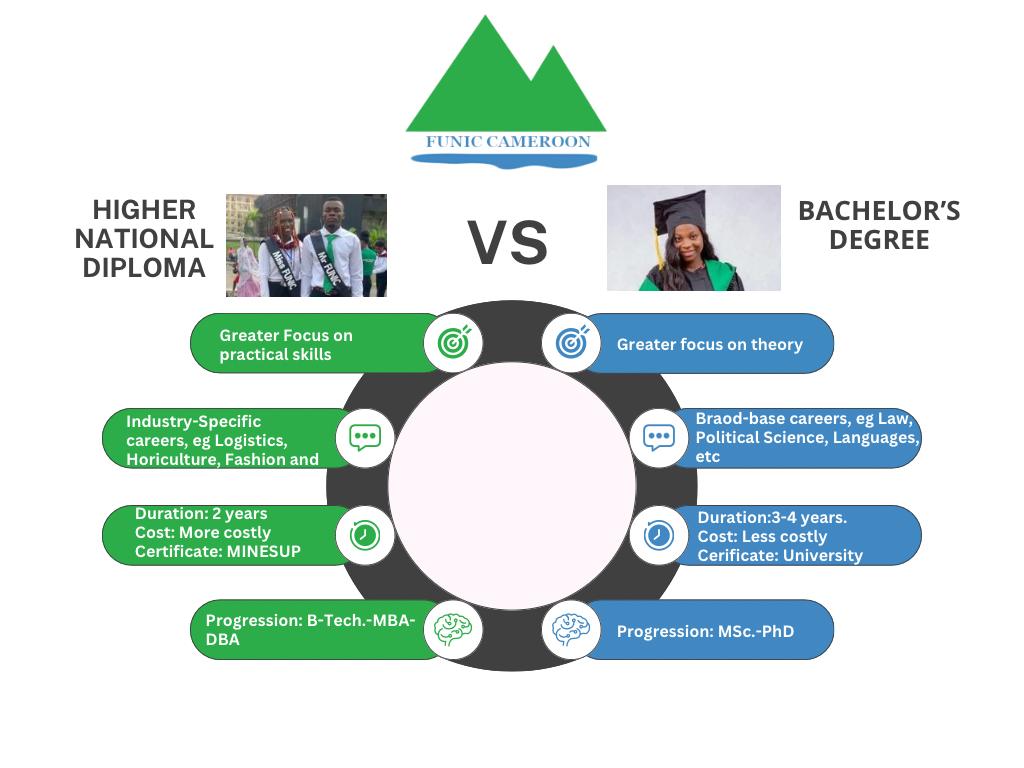
HND vs Bachelor's Degree. Key differences between the two
Education
Many people do not understand the difference between the Higher National Diploma (HND) and the Bachelor of Science (BSc)Degree. While some believe that one is superior in value to the other, others believe that the two have nothing in common. It is a fact that having a higher education can help add value to one's professional journey. In this write up we will explore the difference between HND and bachelor’s degrees.
What is an HND?
A Higher National Diploma (HND) is a professional qualification designed to provide practical skills and training in a particular field of study. It is typically equivalent to the first two years of a bachelor's degree and can take two years to complete.
HNDs in Cameroon are offered in various subject areas including business & management, Agriculture, Fashion and Design, Health Sciences, Engineering, Legal Studies, Communication and many others. The curriculum of an HND was designed to include a combination of coursework, practicals, and internships, providing students with real-world experience that prepares them for the workforce. Employers value practical experience and hands-on training, making HND graduates a lucrative asset. Additionally, entry requirements into HND programs are more relaxed than bachelor’s degrees, making them a more accessible option for all students
HND Programs: Features
Practical Training: The HND program was designed to focus on providing students with practical skills and training directly applicable to the workplace. For example, FUNIC’s has created campus enterprises, startups and firms to give HND students the opportunity of acquiring practical skills in Business/Management. The students work while they study. This way, they acquire practical skills in their chosen fields of study.
Internships and Defense: The HND program includes internship placements, providing students with real-world professional experience and the opportunity to develop professional networks. After internships, students are required to defend a report of their internships. Many BSc degree programs on the other hand do not require students to defend a thesis/report.
Industry-Specific Curriculum: HND programs are often designed to meet the needs of a particular industry, providing students with specialised knowledge, skills, and experiences. This explains why there are HND programs in fields such as Horticulture.
Progression route: Holders of the HND have the opportunity to obtain a highly professional Top-Up degree-The Bachelor of Technology degree or the Bachelor of Science if they desire to switch from Professional to Academic.
What is a Bachelor’s Degree?
A bachelor's degree is the most popular university qualification, typically taking 3-4 years to complete. Bachelor’s degrees provide a more theoretical and broad-based form of education, preparing students for various career opportunities or further study. The curriculum of a bachelor's degree in Cameroon typically includes a combination of lectures, practical assignments, and basic research. Studying a bachelor's degree enables students to gain knowledge, research, and communication skills.
Bachelor's degree: Features
1. A broad-based education: A bachelor's degree provides students with a comprehensive foundation in a particular field of study, imparting skills in theory, research, and critical thinking.
2. Basic Research: Many bachelor's degree programs incorporate research projects that enable students to cultivate foundational research abilities and delve deeper into topics of personal interest through self-directed study.
3. Career Opportunities: A bachelor's degree can lead to a wide range of career opportunities across many sectors, including business, finance, healthcare, law, and more.
Difference between HND and Bachelor Degree
1. HND vs Bachelor’s Degree: Curriculum Differences
HND programs focus more on practical training and skills development, while bachelor’s degrees are more traditional and focus on providing a broader and theoretically based education.
HND programs are typically more specialised and industry-specific, while bachelor’s degrees offer a more general curriculum that provides a broader knowledge base.
2. HND vs Bachelor’s Degree: Employment and Career Prospects
HND graduates typically pursue more Professional careers like business, construction, logistics, and agriculture, where practical experience is highly valued. In contrast, bachelor's degree holders have a wider range of options like law, finance, journalism, political science, gender studies, and healthcare, which require comprehensive academic preparation.
However, HND graduates can have an advantage in industries that place greater emphasis on practical skills gained through Professional education.
3. HND vs Bachelor’s Degree: Cost and Duration
HND programs in Cameroon are typically more expensive and shorter in duration than bachelor’s degrees with HND courses usually taking two years to complete, while a bachelor’s degree typically takes three to four years.
This means the Bachelor’s Degree programs can be a more cost-effective option for students who are price-sensitive.
4. HND vs Bachelor’s Degree: progression Route
Holders of the Bachelor of Technology Degree can progress directly to a Master of Science(MSc) and then to a PhD.
HND is however completed in two years. Holders can top it up to a Bachelor of Technology Degree, then progress to a Master of Business Administration (MBA), then Doctor of Business Administration (DBA).
Typically, Students who pursue the BSc-MSc-PHd route usually envisage a career in academics while students who pursue the HND-B-Tech-MBA-DBA route usually envisage a career in the corporate setting, consultancy, or entrepreneurship.
It should however be noted that in In Cameroon, there is still some confusion regarding these qualifications, and employers give job opportunities to graduates regardless of whether they pursued the Professional or academic tracks. Worth noting is that internationally, many accomplished managers and leaders have pursued MBAs.
5. HND vs Bachelor’s Degree: Certification
In Cameroon, the final examinations for the HND are public examinations organized and supervised by the Ministry of Higher Education(MINESUP). The final certificates are equally issued by the Ministry of Higher Education.
The Bachelor’s degree is university-supervised. This means that the final semester examinations are supervised by the university and the final certificates are equally issued by the University.